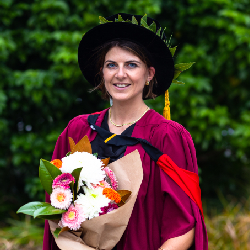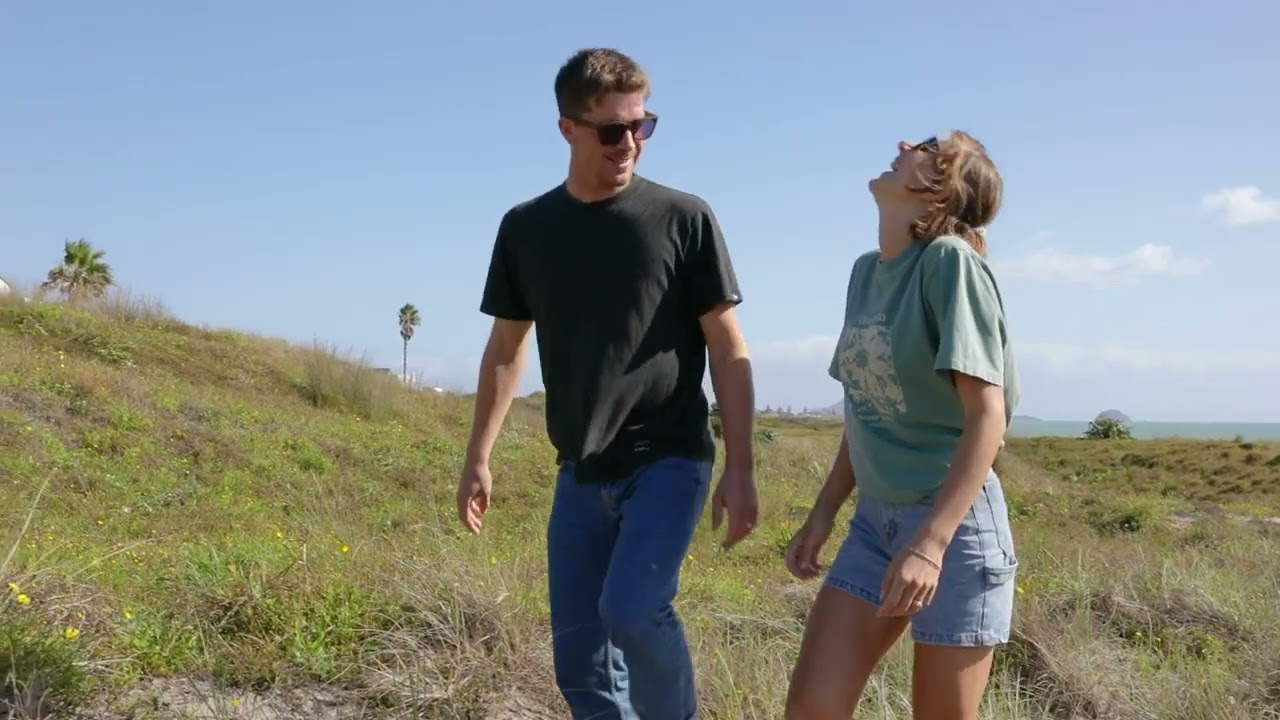
Roberta Marcoli
Now a postdoctoral fellow at James Cook University in Australia, Roberta is studying the molecular and epigenetic changes in barramundi.
Winner of the 2021 Three Minute Thesis Competition

Qualification(s)
It was love that persuaded Roberta Marcoli to leave Italy in 2017 and enrol in a PhD in Biological Sciences at the University of Waikato in Tauranga.
Now, six years later, Roberta, 27, has graduated, with the support of her mum, Loretta Russo, who flew in from Italy, and her now-husband, Sam Aiken.
Roberta, who was the student speaker for her graduation ceremony, developed tools that monitor the health of Chinook salmon to protect the ocean from overfishing.
Her PhD was multidisciplinary, encompassing marine biology, animal physiology, aquaculture and molecular biology/genetics. She received the Ministry of Business Innovation and Employment ‘Aquaculture Health Strategies to Maximise Productivity and Security’ scholarship where she worked with the world's largest producer, King Salmon New Zealand and New Zealand's largest independent science organisation, Cawthron Institute.
“If we can find the best conditions to farm fish, in the most sustainable, ethical and productive ways, aquaculture will produce enough fish and quickly reduce the pressure on the wild stock and help the ocean reflourish,” says Roberta.
“Researchers in aquaculture are working together to create new diets that don’t include fish meals, as well as trying to create tools to protect fish from diseases and overcome the effects of climate change.”

Now a postdoctoral fellow at James Cook University in Australia, Roberta is studying the molecular and epigenetic changes in barramundi.
Roberta was born in a small village between Italy and Switzerland before her family moved to the little fishing village of Celle Ligure.
She spent most of her childhood at the beach, swimming and making sandcastles, and had a particular interest in whales. All Roberta ever wanted to be was a marine biologist.
She started her marine biology degree at the University of Genoa, Italy when she fell in love with Sam - a Kiwi on his overseas travels - and spent the remainder of her degree visiting New Zealand, working in a bar at night to earn money for flights.
“Deep inside I think I was always more Kiwi than Italian. I love walking barefoot on the beach with my dog Kingston and jumping in the ocean for a surf.
“It kept me sane during my PhD. My husband is a super keen surfer, so I started surfing too - most weekends we go away in our van chasing waves, or walk up ‘the Mount’ in Mount Maunganui.”
Roberta wanted to study at Waikato because of the Coastal Marine Field Station’s ground-breaking reputation for teaching and research conducted in Tauranga Harbour and around the Bay of Plenty.
She worked closely with Dr Simon Muncaster, chair in Coastal Science Professor Chris Battershill and the School of Science teams in Tauranga.
The Coastal Marine Field Station offers a unique aquaculture programme and is home to research on the biology, physiology, and ecology of marine species. Undergraduates can take papers in Aquaculture or Environmental Sciences, as part of the Bachelor of Science degree, and postgraduate students can work on research either at the Marine Station in Tauranga or Hamilton campuses.
“The most difficult thing as an international student is being away from your family,” says Roberta, whose father died two months after moving to New Zealand.
“Being an only child and leaving mum in Italy has been a big challenge, especially throughout Covid-19, but I had a great day celebrating with a wine overlooking the ocean in memory of Dad.
“Everyone at Waikato was so welcoming; they were keen to listen, help and cheer for me, even in the hardest parts of my PhD. I never once felt ‘international’.”
Roberta was a tutor for the aquaculture programme, involved in several University events and was the winner of the 2021 Three Minute Thesis Competition where she performed “Mute as a Fish”. She presented her research at the Marine Sciences Society Conference at the Tauranga Campus in 2022 and the Australian Marine Science Association Conference in Cairns, in 2022, as a keynote speaker in her session.
Roberta encourages students to say ‘yes’ to every opportunity that comes their way.

Qualification(s)
